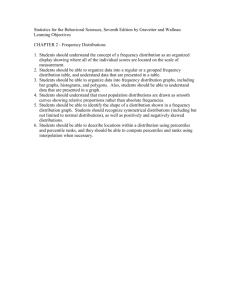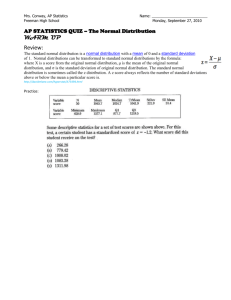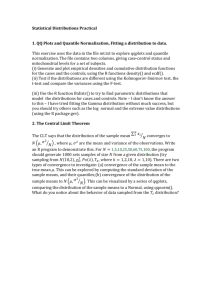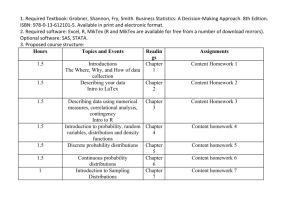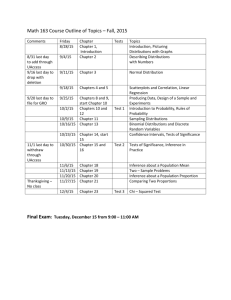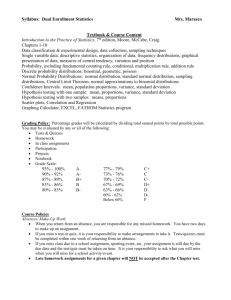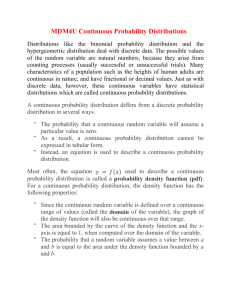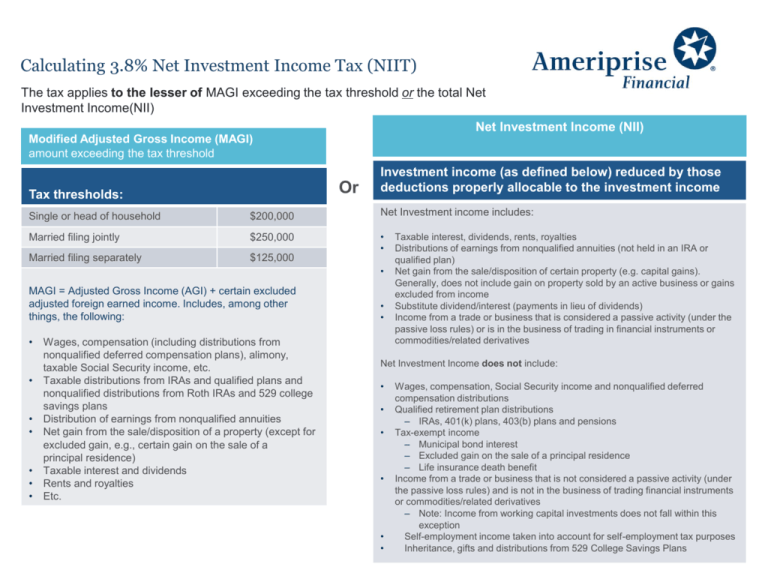
Calculating 3.8% Net Investment Income Tax (NIIT)
The tax applies to the lesser of MAGI exceeding the tax threshold or the total Net
Investment Income(NII)
Net Investment Income (NII)
Modified Adjusted Gross Income (MAGI)
amount exceeding the tax threshold
Or
Tax thresholds:
Investment income (as defined below) reduced by those
deductions properly allocable to the investment income
Single or head of household
$200,000
Net Investment income includes:
Married filing jointly
$250,000
•
•
Married filing separately
$125,000
•
MAGI = Adjusted Gross Income (AGI) + certain excluded
adjusted foreign earned income. Includes, among other
things, the following:
•
•
•
•
•
•
•
Wages, compensation (including distributions from
nonqualified deferred compensation plans), alimony,
taxable Social Security income, etc.
Taxable distributions from IRAs and qualified plans and
nonqualified distributions from Roth IRAs and 529 college
savings plans
Distribution of earnings from nonqualified annuities
Net gain from the sale/disposition of a property (except for
excluded gain, e.g., certain gain on the sale of a
principal residence)
Taxable interest and dividends
Rents and royalties
Etc.
•
•
Taxable interest, dividends, rents, royalties
Distributions of earnings from nonqualified annuities (not held in an IRA or
qualified plan)
Net gain from the sale/disposition of certain property (e.g. capital gains).
Generally, does not include gain on property sold by an active business or gains
excluded from income
Substitute dividend/interest (payments in lieu of dividends)
Income from a trade or business that is considered a passive activity (under the
passive loss rules) or is in the business of trading in financial instruments or
commodities/related derivatives
Net Investment Income does not include:
•
•
•
•
•
•
Wages, compensation, Social Security income and nonqualified deferred
compensation distributions
Qualified retirement plan distributions
– IRAs, 401(k) plans, 403(b) plans and pensions
Tax-exempt income
– Municipal bond interest
– Excluded gain on the sale of a principal residence
– Life insurance death benefit
Income from a trade or business that is not considered a passive activity (under
the passive loss rules) and is not in the business of trading financial instruments
or commodities/related derivatives
– Note: Income from working capital investments does not fall within this
exception
Self-employment income taken into account for self-employment tax purposes
Inheritance, gifts and distributions from 529 College Savings Plans
Reporting requirements for distributions which may be
subject to NIIT
Distribution Code “D” for nonqualified annuities
• If you meet the threshold requirement on the previous page, your nonqualified annuity distributions
(from both deferred and annuitized contracts) may be subject to the 3.8% tax1.
• We do not calculate the potential tax consequence. We are only required by the IRS to indicate annuity
distributions that may be subject to the tax.
− Distribution code “D” to is used in combination with other distribution codes (1, 2, 3, 4, or 7) on
Form 1099-R (Distributions From Pensions, Annuities, Retirement or Profit-Sharing Plans, IRAs,
Insurance Contracts, etc.) for nonqualified annuity accounts to indicate that the distribution in
question may be subject to the 3.8% tax (under section 1411).
− Distribution code “D” would not apply to distributions from IRAs or other qualified retirement
accounts because those distributions are generally not subject to the 3.8% tax.
• For more information on the Net Investment Income Tax refer to Tax Filing FAQ.
• Given the complexity of the 3.8% tax, if this tax is applicable for you based on the guidelines above, we
encourage you to work with a qualified tax professional to understand how this 3.8% tax may impact
your specific situation and address your questions.
1Certain
high-income taxpayers, depending on your Modified Adjusted Gross Income or net investment income
Neither Ameriprise Financial nor its representatives may provide tax or legal advice. Consult your tax advisor or attorney regarding specific issues.
© 2013-2015 Ameriprise Financial, Inc. All rights reserved.
Ameriprise Financial Services, Inc., Member FINRA and SIPC.


